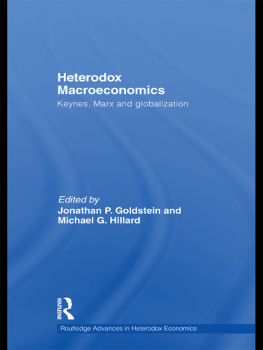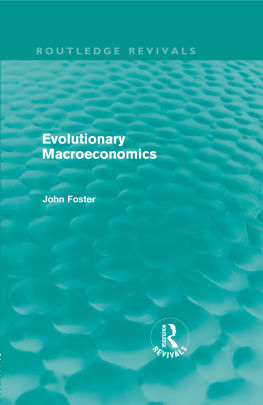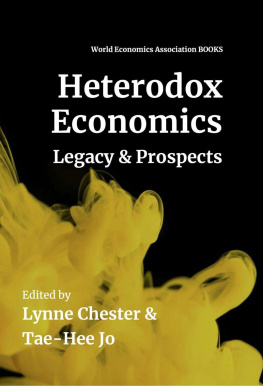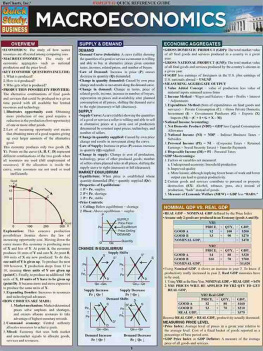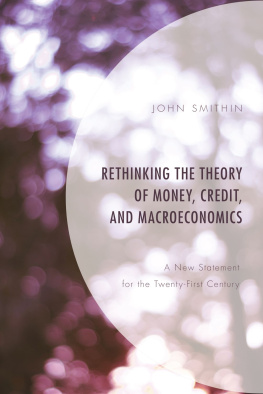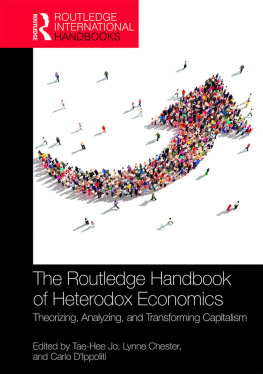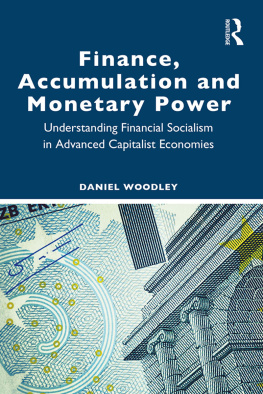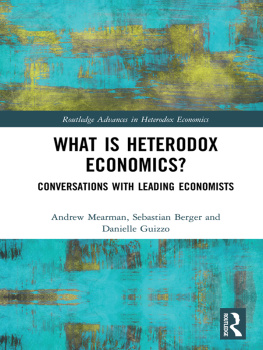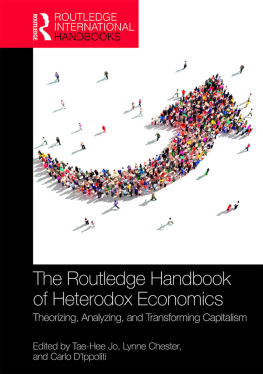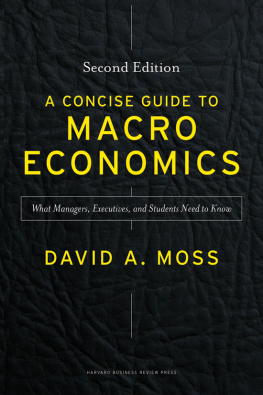Heterodox Macroeconomics
The global financial crisis of 2008 is rooted in the contradictory macroeconomic dynamics of the current variant of globalization. The gradual evolution of such a crisis inevitably pushes macroeconomic theory, particularly critical/heterodox theory, in new directions. A subset of these theoretical developments has resulted in a much improved integrated heterodox approach based on the original contributions of Keynes, Marx and early institutionalists. An integrated theory that is more coherent, logically consistent, realistic, flexible and capable of explaining modern macrodynamics in historical time has emerged.
Heterodox Macroeconomics offers a detailed understanding of the foundations of the recent global financial crisis. The chapters, from a selection of leading academics in the field of heterodox macroeconomics, carry out a synthesis of heterodox ideas that place financial instability, macroeconomic crisis, rising global inequality and a grasp of the perverse and pernicious qualities of global and domestic macroeconomic policy making since 1980 into a coherent perspective. It familiarizes the reader with the emerging unified theory of heterodox macroeconomics and its applications.
The book is divided into four key parts:
- heterodox macroeconomics and the KeynesMarx synthesis;
- accumulation, crisis and instability;
- the macrodynamics of the neoliberal regime; and
- heterodox macroeconomic policy.
The chapters include theoretical, international, historical and country perspectives on financial fragility and macroeconomic instability.
This book will be of interest to students and researchers in macroeconomics, heterodox economics, political economy, Marxian economics, post Keynesian economics, crisis theory, globalization and financialization.
Jonathan P. Goldstein is Professor of Economics at Bowdoin College, Brunswick, Maine. His fields of specialization include political economy, macroeconomics and applied econometrics. Michael G. Hillard is Professor of Economics at the University of Southern Maine, Portland, Maine. He has written widely on labor relations, labor history and the political economy of labor.
Routledge advances in heterodox economics
Edited by Frederic S. Lee
University of Missouri-Kansas City
Over the past two decades, the intellectual agendas of heterodox economists have taken a decidedly pluralist turn. Leading thinkers have begun to move beyond the established paradigms of Austrian, feminist, Institutional-evolutionary, Marxian, Post Keynesian, radical, social, and Sraffian economicsopening up new lines of analysis, criticism, and dialogue among dissenting schools of thought. This cross-fertilization of ideas is creating a new generation of scholarship in which novel combinations of heterodox ideas are being brought to bear on important contemporary and historical problems.
Routledge Advances in Heterodox Economics aims to promote this new scholarship by publishing innovative books in heterodox economic theory, policy, philosophy, intellectual history, institutional history, and pedagogy. Syntheses or critical engagement of two or more heterodox traditions are especially encouraged.
- Ontology and Economics
Tony Lawson and his critics
Edited by Edward Fullbrook
- Currencies, Capital Flows and Crises
A post Keynesian analysis of exchange rate determination
John T. Harvey
- Radical Economics and Labor
Frederic Lee and Jon Bekken
- A History of Heterodox Economics
Challenging the mainstream in the twentieth century
Frederic Lee
- Heterodox Macroeconomics
Keynes, Marx and globalization
Edited by Jonathan P. Goldstein and Michael G. Hillard
This series was previously published by The University of Michigan Press and the following books are available (please contact UMP for more information):
- Economics in Real Time
A theoretical reconstruction
John McDermott
- Liberating Economics
Feminist perspectives on families, work, and globalization
Drucilla K. Barker and Susan F. Feiner
- Socialism After Hayek
Theodore A. Burczak
- Future Directions for Heterodox Economics
Edited by John T. Harvey and Robert F. Garnett, Jr.
Heterodox Macroeconomics
Keynes, Marx and globalization
Edited by Jonathan P. Goldstein and Michael G. Hillard
First published 2009
by Routledge
2 Park Square, Milton Park, Abingdon, Oxon OX14 4RN
Simultaneously published in the USA and Canada
by Routledge
270 Madison Ave, New York, NY 10016
Routledge is an imprint of the Taylor & Francis Group, an informa business
This edition published in the Taylor & Francis e-Library, 2009.
To purchase your own copy of this or any of Taylor & Francis or Routledges collection of thousands of eBooks please go to www.eBookstore.tandf.co.uk.
2009 selection and editorial matter; Jonathan P. Goldstein and Michael G. Hillard; individual chapters, the contributors
All rights reserved. No part of this book may be reprinted or reproduced or utilized in any form or by any electronic, mechanical, or other means, now known or hereafter invented, including photocopying and recording, or in any information storage or retrieval system, without permission in writing from the publishers.
British Library Cataloguing in Publication Data
A catalogue record for this book is available from the British Library
Library of Congress Cataloging in Publication Data
Heterodox macroeconomics: Keynes, Marx and globalization/edited by Jonathan P. Goldstein and Michael G. Hillard.
p. cm.
Includes bibliographical references and index.
1. Macroeconomics. I. Goldstein, Jonathan P. II. Hillard, Michael G.
HB172.5.H48 2009
339dc22 2008050954
ISBN 0-203-87670-9 Master e-book ISBN
ISBN10: 0-415-77808-5 (hbk)
ISBN10: 0-203-87670-9 (ebk)
ISBN13: 978-0-415-77808-4 (hbk)
ISBN13: 978-0-203-87670-1 (ebk)
To Jim Crotty, who inspired generations of graduate students and colleagues and who has done more than any scholar to advance and apply a synthesis of Keynes and Marx to the contemporary era.
Illustrations
Figures
Post-peak US real GDP growth: small and big government and neoliberal eras
Post-peak US unemployment rate: small and big government and neoliberal eras
Post-peak US price inflation (changes in GDP deflator): small and big government and neoliberal eras
Post-peak US real interest rates: small and big government and neoliberal eras
Post-peak US real non-government wage and salary payments: big government and neoliberal eras
Post-peak changes in the manufacturing profit rate: big government and neoliberal eras
Post-peak changes in mortgage debt: big government and neoliberal eras
Income classes
The optimal solution and GS tradeoff
The effect of d on optimal I
The Marxian competition effect
Total and household credit market debt as a percentage of GDP
NFC credit market debt as a percentage of NFC net worth
NFC financial liabilities as a percentage of internal funds
NFC gross interest payments as a percentage of internal funds
NFC total financial payments as a percentage of internal funds
NFC financial income as a percentage of internal funds
NFC debt as a percentage of NFC financial assets

